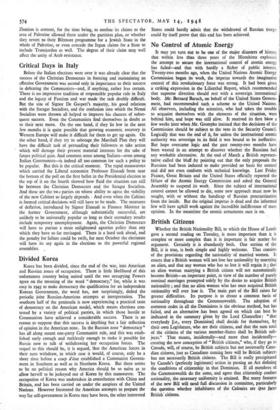Divided Korea
Korea has been divided, since the end of the war, into American and Russian zones of occupation. There is little likelihood of this unfortunate country being united until the two occupying Powers agree on the meaning of the word " democracy," for, while it was easy in 1945 to make democracy the qualification for an independent Korean Government, the word has, not surprisingly, defied the periodic joint Russian-American attempts at interpretation. The southern half of the peninsula is now experiencing a practical taste of democracy on the American model, which means elections con- tested by a variety of political parties, in which those hostile to Communism have achieved a considerable success. There is no reason to suppose that this success is anything but a fair reflection of opinion in the American zone.. In the Russian zone " democracy " has all along meant one-party Communist rule, and this was estab- lished early enough and ruthlessly enough to make it possible for Russia now to talk of withdrawing her occupation forces. The sequel to this should be, it is argued, that the American forces in their turn withdraw, in which case it would, of course, only be a short time before a coup d'etat established a Communist Govern- ment in Southern as well as in Northern Korea. But there seems to be no political reason why America should be so naive as to allow herself to be jockeyed out of Korea by this manoeuvre. The occupation of Korea was undertaken in consultation with China and Britain, and has been carried on under the auspices of the United Nations. However frustrated the American attempts to prepare the way for self-government in Korea may have been, the other interested
States could hardly admit that the withdrawal of Russian troops could by itself prove that this end has been achieved.






























 Previous page
Previous page